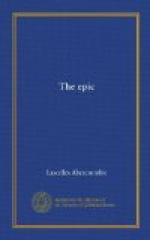Epic poetry exhibits life in some great symbolic attitude. It cannot strictly be said to symbolize life itself, but always some manner of life. But life as courage—the turning of the dark, hard condition of life into something which can be exulted in—this, which is the deep significance of the art of the first epics, is the absolutely necessary foundation for any subsequent valuation of life; Man can achieve nothing until he has first achieved courage. And this, much more than any inheritance of manner, is what makes all the writers of deliberate or “literary” epic imply the existence of Homer. If Homer had not done his work, they could not have done theirs. But “literary” epics are as necessary as Homer. We cannot go on with courage as the solitary valuation of life. We must have the foundation, but we must also have the superstructure. Speaking comparatively, it may be said that the function of Homeric epic has been to create imperishable symbolism for the actual courageous consciousness of life, but the duty of “literary” epic has been to develop this function, answerably to the development of life itself, into symbolism of some conscious idea of life—something at once more formalized and more subtilized than the primary virtue of courage. The Greeks, however, were too much overshadowed by the greatness of Homer to do much towards this. The Argonautica, the half-hearted epic of Apollonius Rhodius, is the only attempt that need concern us. It is not a poem that can be read straight through; it is only enjoyable in moments—moments of charming, minute observation, like the description of a sunbeam thrown quivering on the wall from a basin of water “which has just been poured out,” lines not only charming in themselves, but finely used as a simile for Medea’s agitated heart; or moments of romantic fantasy, as when the Argonauts see the eagle flying towards Prometheus, and then hear the Titan’s agonized cry. But it is not in such passages that what Apollonius did for epic abides. A great deal of his third book is a real contribution to the main process, to epic content as well as to epic manner. To the manner of epic he added analytic psychology. No one will ever imagine character more deeply or more firmly than Homer did in, say, Achilles; but Apollonius was the man who showed how epic as well as drama may use the nice minutiae of psychological imagination. Through Virgil, this contribution to epic manner has pervaded subsequent literature. Apollonius, too, in his fumbling way, as though he did not quite know what he was doing, has yet done something very important for the development of epic significance. Love has been nothing but a subordinate incident, almost one might say an ornament, in the early epics; in Apollonius, though working through a deal of gross and lumbering mythological machinery, love becomes for the first time one of the primary values of life. The love of Jason and Medea is the vital symbolism of the Argonautica.




